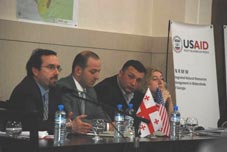Groundbreaking Project on Water Sustainability Makes Progress
By Gvantsa Gabekhadze
Friday, December 16

As is frequently mentioned, Georgia, which is an agricultural country whose water supply is enviable, faces quite serious problems in this regard. Still, there are many regions in Georgia with water related problems and old fashioned or useless irrigation systems which on create problems for Georgian agriculture and in general the economy of the country. Despite some positive changes regarding preservation and the rational usage of existent natural resources, state policy still remains suboptimal and much is left to be done in this area.
The four year program, which was launched a year ago is currently involves studies of the situation while practical implementation of the project is due in the following years. The importance of the project has been underlined by the representatives of different ministries, who mentioned that such kinds of projects regarding natural resources have not been carried out before. Partner organizations have fulfilled different activities, including research, launching relations with local communities, setting up eco clubs, increasing awareness of people and especially young people regarding natural resources protection, and finally, selected four pilot areas: Alazani on the upper watershed of the river, Alazan–Iori on the lower watershed of the river, and the Rioni's upper and lower watersheds. At the same time 31 communities have been selected based on several criteria like the number of people, being near to rivers, lack of drinking water, connection to protected areas and so on.
However, there were hints by some member of NGOs that the process has been lengthened due “to people with an old fashioned mentality in Georgian state structures “ , mainly, the young government employees that somehow create obstacles for the project implementation.
As the ambassador of the United States, John Bass told The Messenger, the project is targeted at several outcomes: ”it serves better usage and protection of Georgian natural resources, assistance of the local communities who face different and serious problems in this field, and increase knowledge regarding the issue in Georgian society.” The ambassador mentioned that implementing such projects is not imposed due to current authorities inert attitude concerning the problem , ”for example the issue of protected territories has not been properly solved or paid attention to by the governmental structures.” However, he continued, ”such projects in general aim to teach people how to think differently, develop new approaches, create different attitudes and relations between the communities and the government teaching people what democratic culture is.”
Responsibilities concerning natural resources are shared between different ministries such as the Ministry of Environment Protection, the Ministries of Health, Energy, Agriculture. “ Nothing is planned by donors, everything is planned together based on a sharing of views and experiences and only after thinking and agreement concrete steps are made. Thus, a lot of very important projects have been launched and implemented,” deputy minister for environment protection, Giorgi Zedginidze, told The Messenger. Such kind of project is unique and even for Georgian ministers it is seen as a pilot for future ones.
The issue all sides paid attention to was the importance of the integrity of different state structures and organizations to solve the problems related to natural resources' rational usage and as it was obvious while meeting with locals in Kakheti that such problems are really very painful for the region's residents. It should also be noted as well that they have been facing such problems for several years and yet no deep projects or useful state intervention have been carried out to solve even some of the simpler issues such as irrigation systems and so on.
As for the project, partners make frequent statements that the growth of awareness regarding natural resources would be one of the main points for solving problems. This seems to be justified as children of the region seemed really interested in nature issues and in the framework of eco clubs launched within the project the local younger generation has already initiated and implemented positive activities in this regard.
